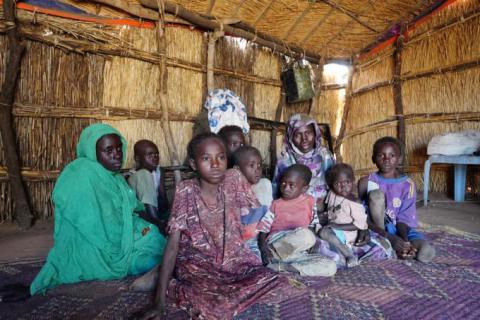Amidst Sudan's Hunger Crisis: Health Facilities Tackle Malnutrition in North Darfur

Credit for all images: Save the Children / DAR company / Kalamendo, North Darfur
Amira is a mother of 10 children and a widow after her husband died in an accident. She and three of her children were suffering from malnutrition until Save the Children started supporting her with funding from the European Union.
“I receive nutritious biscuits and, thanks god, the organization (Save the Children) gave us also goats. Now my children can drink goat milk. Before they were drinking only black tea with a little bit of bread. Two of them already recovered from malnutrition, only one is left.”
Amira’s last year was one of the hardest in her life: About a year ago her husband was riding a camel while searching for work. A young child scared the camel and her husband fell off. With severe injuries in the neck and back area of the vertebrae, he was delivered to a hospital in the capital Khartoum. However, he remained fully paralyzed as a result of the fall and passed away only a few months later.
“It was an extremely difficult time for me. At the same time as my husband passed away, I gave birth to my youngest child”.

Struggling to make ends meet, Amira had to take a very tough decision. She accepted that her eldest daughter drops out of school, so that the two of them can work together in order to pay for the education of the other children:
“I thought of selling the goats to provide for the children’s education, but my eldest daughter refused the idea. She said, I will leave the school and support you, but don’t sell the goats, because they give milk for the kids. I wish all the best for my daughter. I wish that my daughter’s dreams come true. I wish that my kids will be successful at school. I did not go to school. I left school very early and I don’t have a proper job. I want them to have a better life.”
Next to some small-scale farming, Amira and her daughter go to collect straw in the fields. Once a week they sell the straw in the market to earn some money. This allows Amira to pay for the education of her other children.
Yet, another tragic accident hit the family a few months ago: “One of my daughters got bitten by a donkey in her thigh. The doctor referred us to a hospital in El Fasher (North Darfur), but the rabies antidote was not available there. They brought it from another city and it was too expensive. We suffered a lot due to my daughter’s sickness; we sold all the harvest we had like sorghum and peanuts to pay the price of the medicines.”

After the harvest, Amira tries to keep some of the grains as seeds for the coming season. Yet, when the hay and straw sales at the market do not go well, she sees herself forced to bring the grains to the mill in order to cook porridge for her kids.
Without the additional support from Save the Children, life would be even more difficult for her: “When my malnourished child cries, then I give her the nutritious biscuits. All I want to say is thanks to the people of the organization. They have my heartfelt gratitude and every time I pray with my children we thank them for what they have offered us. They supported us a lot.”
 Sudan
Sudan